|
|

|
|

“God sent me before you to preserve for you a remnant on earth, and to keep alive for you many survivors.”
– Genesis 45: 7
With the decline of Christendom and ever-dwindling numbers of people in the pews, many of us lament what we perceive is the deterioration of our position of influence in the world. There is a lot of anxiety about the future of the Church; both on the congregational and denominational level. We gaze at aging buildings with looming mortgages, we crunch the numbers, we worry about what is next. How will the church survive? What will become of us?
I feel this strain too. It is very real for me. As I await call as a pastor, I am troubled by a nagging fear that I have chained myself to an institution that is essentially a botched experiment.
And in reality?
I have.
The institution of the church is imploding. And I could spend time in this piece outlining my thoughts on how exactly that happened, or conducting an (albeit slightly premature) post-mortem. But to be honest that has been done. And I’m bored.
Instead, I would rather focus my energy on the future of the church that is not really the future at all. It is the present. It is the past. Like so many mystical, holy things, it is now and soon and has been, all at once. All throughout history, even and especially in the bleakest of moments, God has lifted up for us witnesses to God’s timeless power breaking in through the here and now.
There is no future church. Because it is already here. It is now. The future church will continue to be found in the places where the most faithful remnant has always been – on the outside. We do not, as Official Church People ™, have to create it or strategize to make it happen. We do not have to figure it out and spell out the plan. If we want to see where the Right Now of the Church is in this moment, all we have to do is look to the places where the Spirit is already at work.
In the anarchist mutual-aid group.
In the self-defense collective of Black trans women reimagining safety.
In the multiplying love of the polycule.
In the children baptized in the fire hydrants of the streets in the heatwave.
In those dancing on the grave of How-Its-Always-Been, singing freedom songs.
These groups might not call themselves the church. So maybe we shouldn’t either. But places like these are the best expressions of God’s liberating love that we have. They are resilient, creative people. People who the world has tried to stamp out and yet God has delivered, as a remnant.
They are not a fantasy of the future. They are here and now, in flesh and blood, in grit and glitter, in pain and in power.
If we want to know what God is up to, if the Church wants to move into the future, that’s where we should cast our lot.
Image Description: A Photo of Elle Dowd smiling against a brick wall, with the ELM logo along with the words: Future Church
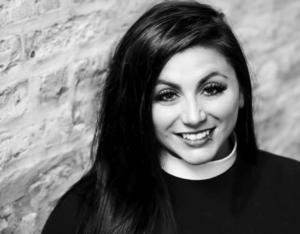 Elle Dowd (she/her/hers) is a bi-furious recent graduate of the Lutheran School of Theology at Chicago and a candidate for ordained ministry in the Evangelical Lutheran Church in America.
Elle Dowd (she/her/hers) is a bi-furious recent graduate of the Lutheran School of Theology at Chicago and a candidate for ordained ministry in the Evangelical Lutheran Church in America.
Elle has pieces of her heart in Sierra Leone, where her two children were born, and in St. Louis where she learned from the radical, queer, Black leadership during the Ferguson Uprising.
She was formerly a co-conspirator with the movement to #decolonizeLutheranism and currently serves as a board member of the Euro-Descent Lutheran Association for Racial Justice, does community organizing in her city as a board member of SOUL, serves on the Clergy Advocacy Board for Planned Parenthood, writes regularly as part of the vision team for the Disrupt Worship Project, and facilitates workshops in both secular conferences and Christian spaces. She is publishing a book with Broadleaf, Baptized in Teargas, about her conversion from a white moderate to an abolitionist which will be released on August 10 and is available for pre-order now.
Elle loves spending time with the people she loves and on weekends when there isn’t a global pandemic, she tours the city of Chicago in search of the best brunch.
To get in touch with Elle and to keep up with updates, you can visit her website www.elledowd.com and subscribe to her newsletter.
You can also see her online ministry via Facebook.com/elledowdministry
or follow her on Twitter/SnapChat/Insta @hownowbrowndowd
or on TikTok @elledowdministry
And pre-order her book Baptized in Teargas: From White Moderate to Abolitionist here https://bit.ly/2YICjBf

Dear Church, I’m the young adult you say you want. And I’ve got to admit this: Church, after waiting 18 months for a call because I’m queer, you came so damn close to losing me. I know that the Church as she is, is dying and that something new is being reborn.
So what do I think the Future Church looks like? Honestly, I think it looks like the mission congregation I’m serving today: The Dwelling, Winston-Salem. At The Dwelling we’re focused on two main things: the sacraments and living into God’s active story among our community.
The entire life of The Dwelling is centered in the sacraments. In addition to gathering together every week for a service of Holy Communion, we also eat together. A lot. We’re working on being able to host community meals every Sunday- and we’re halfway there. We gather together not only to receive grace through the meal of the eucharist, but to receive grace through communion with each other.
As a community, we celebrate baptisms, welcoming sisters, brothers, and siblings into the community of faith. And twice a week, The Dwelling’s mobile Shower Trailer rolls out. Our shower trailer is a way that we can share God’s gift of water, and the cleansing, healing properties of water, with our community of folks experiencing homelessness. There are no boundaries around who can shower- if someone wants one, they can get one.
The Dwelling also focuses on finding God active in our community today. No one is barred from entering God’s church at The Dwelling, and we have several folks in active addiction and various levels of recovery. Our leadership team is made up of folks currently experiencing homelessness and folks who have experienced homelessness, but are currently housed. There are no barriers to our leadership team. If someone wants to serve, then The Dwelling finds a place for them to serve.
This type of community- one that focuses not on the brokenness the world names, but on the Belovedness that God names, is the future of the Church. It is a place that acknowledges all are at least a bit broken, and no one has all the answers. It’s a place where folks, even marginalized folks, are leaders of ministry and not solely guests to ministry. It’s a place that listens to the movement of the Holy Spirit and finds ways to join in her dance.
So Church, what will the future look like? My bets are on this.
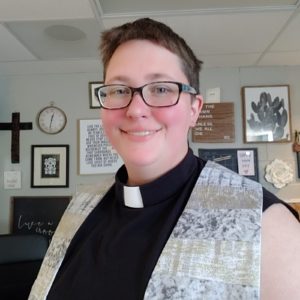 Rev. Tobi Fleck (they/them) currently serves as the associate pastor at The Dwelling, Winston-Salem, a faith community primarily for people who have or are currently experiencing homelessness. In their free time, they enjoy playing games with friends, reading young adult fiction, and spending time out in creation.
Rev. Tobi Fleck (they/them) currently serves as the associate pastor at The Dwelling, Winston-Salem, a faith community primarily for people who have or are currently experiencing homelessness. In their free time, they enjoy playing games with friends, reading young adult fiction, and spending time out in creation.
Rev. Drew Stever, they/he I had top surgery four years ago. It was three months after the US presidential election and four months after I came out as transgender. I gathered the required letters from all my doctors. I was approved for a surgery that would drastically improve my well-being. This was in a time when “gender-affirming surgeries” were still considered to be “cosmetic” by many major insurance companies. Thankfully, my insurance covered over half of the bill. But I was still responsible for over $6,000. I am not Beyonce, nor am I Lizzo. I could not afford even $1,000. I was frantic. I did not want the hospital to come after me because I could not pay a bill for something that I needed. A mentor of mine suggested I do something that sounded so simple, but in practice, felt so uncomfortable: ask for help. “Tell your story,” they said. Be vulnerable. I mulled it over for a while and quickly decided I didn’t have any other option. I danced the Carlton dance from Fresh Prince (badly.) I lip-synced to Whitney Houston (badly.) I got coffee with people I love, but hadn’t seen in a long time. I asked for help. My people are not executives, nor are they international royalty. Support came in amounts of 5, 10, and 100 dollars. They came from all over the world. Slowly, we made our goal of over $6,000. There was no capital campaign. There was no major celebrity spokesperson. There was no feature on the news. Everything I needed was right in front of me – in my relationships. Dear Church: Everything we need is right in front of us. Who we know. Who we love. Who we spend our time with. The scarcity mentality of the church is one that is rooted in the inability to be creative. It is rooted in empire, white supremacy, heteronormativity, capitalism and ableism. We have come to believe that we are alone in our own liberation from that which separates us from God – be it depression, addiction, privilege, racism, internalized homo-/transphobia, anxiety. You name it. We believe we have to do this ourselves. Author and activist adrienne marie brown writes, “E-V-E-R-Y-T-H-I-N-G—is connected. The soil needs rain, organic matter, air, worms and life in order to do what it needs to do to give and receive life. Each element is an essential component…Nature teaches us that our work has to be nuanced and steadfast. And more than anything, that we need each other—at our highest natural glory—in order to get free,” (Emergent Strategy). To think that we are alone is to think something that is entirely false. It is to think something that goes against all of God’s creation. The future of the church is not one that is rooted in “pulling ourselves up by our bootstraps,” but rather, a church, a people that takes off our boots and says, “Hey. I have a huge blister and it’s been there for a while. Could you take a look at it?” It is risking the challenge of being vulnerable about our deepest needs as a community and as people. What would happen if we just believed that we had everything we could possibly need right in front of us? Image Description: A Photo of Drew’s eye and the ELM logo with the words: Future Church  Rev. Drew Stever(they/he) serves as Lead Pastor at Hope Lutheran Church in Hollywood, California. Drew likes to take strolls – not too fast, and not too slow. He is a novice front yard bird watcher and is a big fan of Mary Oliver. Rev. Drew Stever(they/he) serves as Lead Pastor at Hope Lutheran Church in Hollywood, California. Drew likes to take strolls – not too fast, and not too slow. He is a novice front yard bird watcher and is a big fan of Mary Oliver. |
|
|
I love a good musical. Growing up, I was the quintessential theatre nerd: I ate, slept, and breathed theatre for many, many years. I first became aware of racism and the complexities of my multiethnic identity while watching West Side Story — not understanding, as a 7-year-old, why half of my identity was considered good and the other half bad. I fought for the opportunity to see the upcoming RENT film when complimentary movie tickets were donated to local schools in the area. I even had a conversation with Adam Pascal, star of RENT on Broadway and film, that made a huge impact on me while I worked on the youth production of the show. I first learned to waltz in Cinderella and would go on to compete in ballroom dance two years later. My life belonged to the arts and I couldn’t see myself doing anything else. I loved Broadway and anything Broadway adjacent. If I’m being honest with myself I still do, though my tastes have varied as I’ve gotten older.
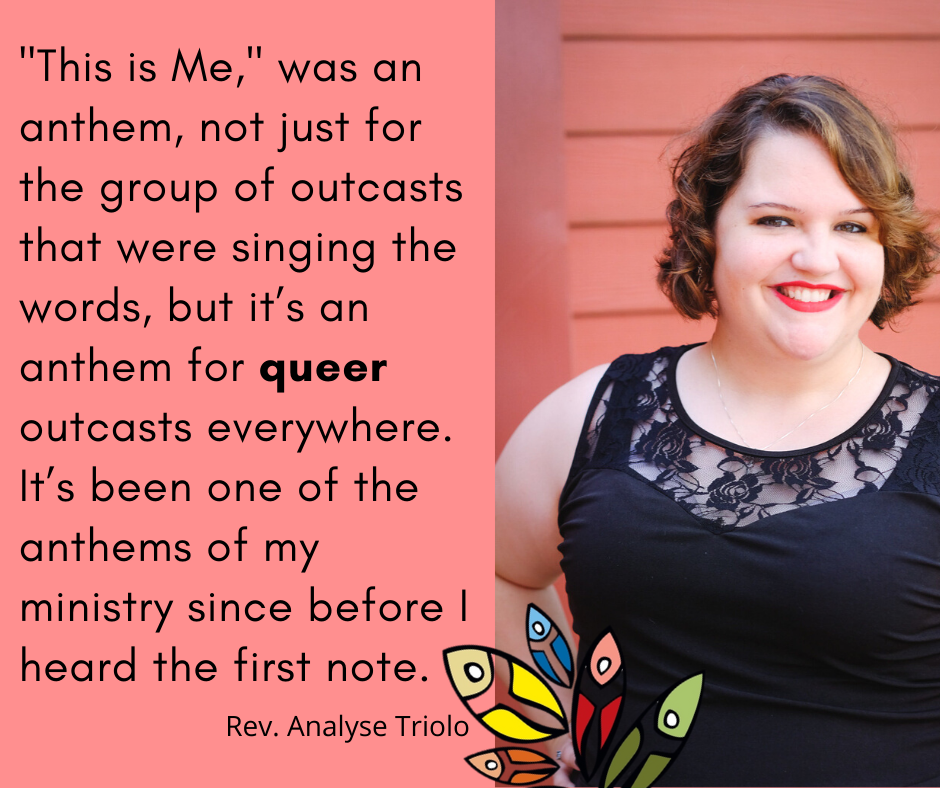
In spite of that I never saw The Greatest Showman until I was quarantined in the parsonage in Queens, NY. I was afraid that the hype would only lead to disappointment, and at that point in my life, disappointment was something I had in spades. I watched, mesmerized, recognizing lifts I’d done in my own ballroom routines present in the film’s choreography. When I heard Broadway actress Keala Settle perform “This is Me” I wept. A lot. The song was an anthem, not just for the group of outcasts that were singing the words, but it’s an anthem for queer outcasts everywhere. It’s been one of the anthems of my ministry since before I heard the first note.
I am not a stranger to the dark
Hide away, they say
‘Cause we don’t want your broken parts
I’ve learned to be ashamed of all my scars
Run away, they say
No one’ll love you as you are
Ministry has come dangerously close to breaking me several times over the last decade as I coped with my Mom’s cancer diagnosis and passing, a grueling and often demeaning call process, and then finally beginning ministry five weeks prior to finding myself within 5 minutes of the first Coronavirus Epicenter.
I am brave, I am bruised
I am who I’m meant to be, this is me
I’ve had to fight my entire life. It’s not uncommon for the women in my family, it turns out. I had to fight in my first middle school because I wasn’t white enough, and again in my second school when I was not Hispanic enough. I’ve had to fight bisexual erasure, informing people that it isn’t just a phase. I’ve had to battle my own perceptions of what being bisexual enough even meant. I still do.
And I know that I deserve your love
There’s nothing I’m not worthy of
Let me tell you, walking into the 2019 Churchwide Assembly felt like how I imagine Lettie Lutz and the rest of the performers walking into that reception at the start of the song. I was armed with rage fueled by years of rejection, heartbreak, and silencers that spoke louder than any words could’ve. It’s what had brought me there with a singular goal of sharing my story publicly, and to do one of the boldest things I’ve ever done in my life at the end of the Assembly’s first plenary session. I tracked down the newly elected Bishop of my assigned synod, introduced myself, and politely informed him I hadn’t heard from his office in six months. Two weeks after the conclusion of my time in Milwaukee I had an apology from the Synod and paperwork for the church that would eventually call me.
I suspect I’ll be fighting for the rest of my life in one way or another. Fighting to face my own demons. Fighting to love the messy parts of myself I often try to hide. And fighting to leave this world better than I found it for those who come after me. I haven’t had the easiest journey, but I haven’t had the hardest one either, and I take pride in doing the work.
This is me.
Rev. Analyse Triolo (she/her) is a year and a half into the wild adventure of Pandemic Pastoring in the mystical land of Queens, NY. In her spare time, she enjoys reading comics, Greek Mythology, and planning out her bi-furious half-elven rogue (Tiefling Rogue? She can’t decide…) for her next D&D Campaign. She also loves singing showtunes so loud her neighbors can hear. Analyse multi-classed as a Master of Divinity while at the Wake Forest University School of Divinity, and as a Master of Arts in Ministry at the Lutheran School of Theology at Chicago. Roll for initiative!
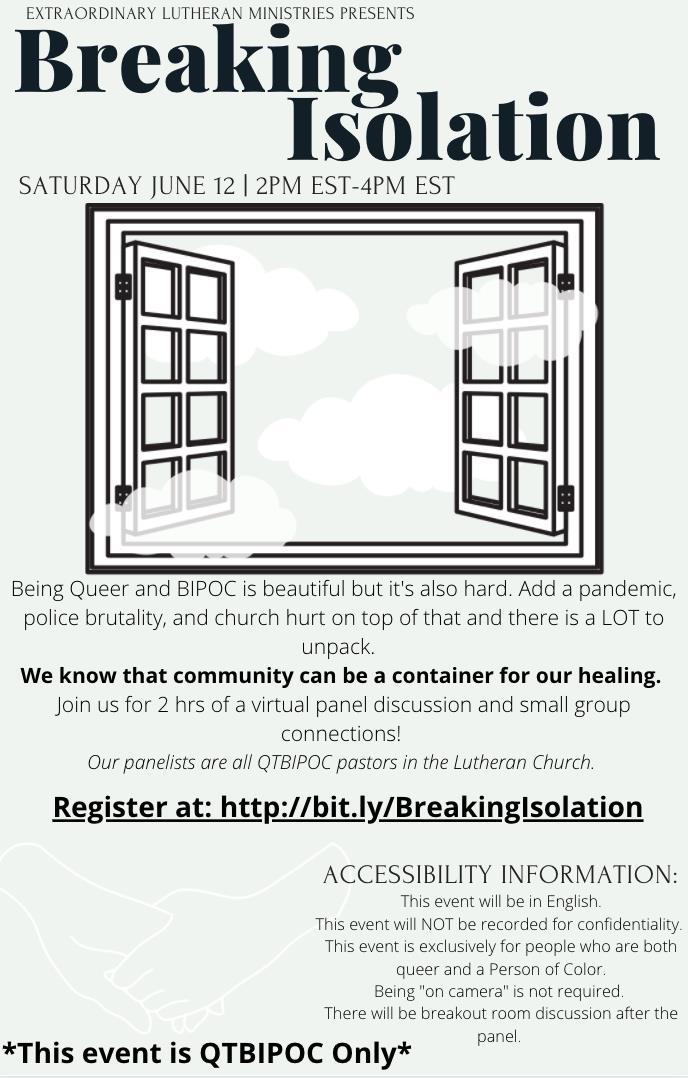 |
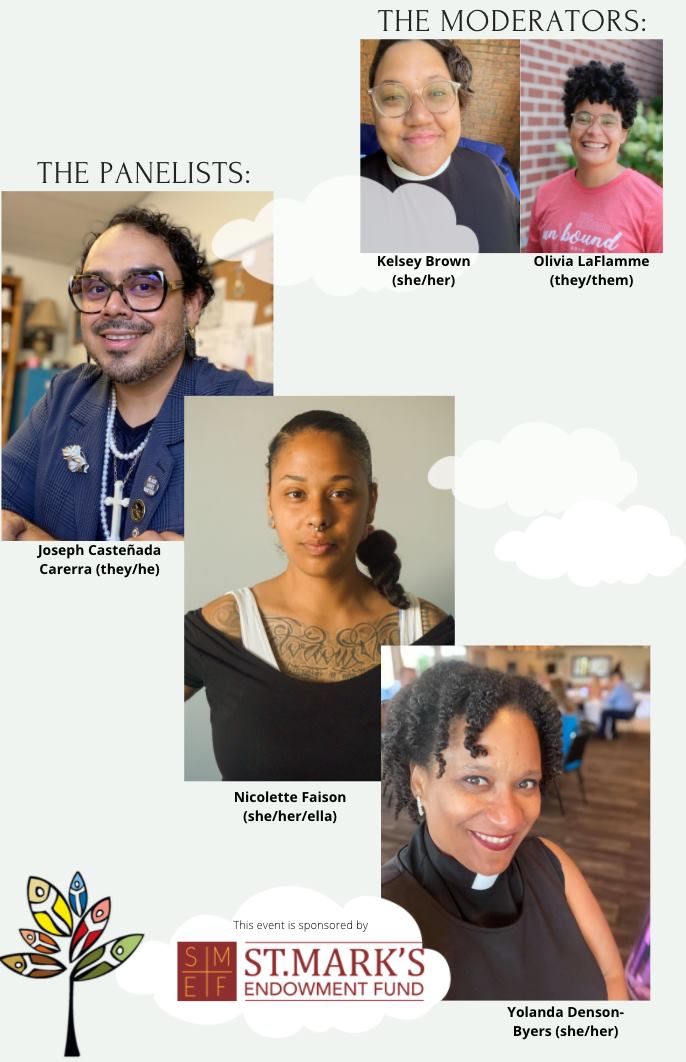 |
Click Here for the PDF version of the flyer
There are not many places in the world made for Black Queer folks
As June rolls around I see the pride advertisements pop up like a field of dandelions
A sea of white
That’s not to say that Black folks have been absent from the movement for LGBTQIA+ equality
In fact, we would not have Pride, or a reason to celebrate without the risks taken by Black and Latino Trans Women from San Francisco to Stonewall
But being Black and being Queer have never been something I’ve taken for granted
I stand on the shoulders of these powerhouse people who made a way long before I was even a twinkle in my mothers’ eye.
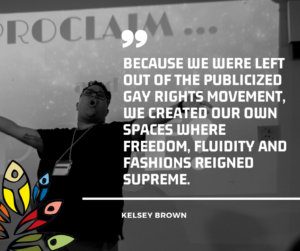
Because we were left out of the publicized Gay rights movement, we created our own spaces where freedom, fluidity and fashions reigned supreme.
Ballroom and the culture surrounding it transforms the lives of all who encounter it
It’s so much more than “Yass Queen” and “Spilling the tea”
It’s a safe space where the outcast and turned away are welcomed into a new family, one that uplifts and affirms
Houses become safe havens and strangers become inseparable
Now don’t get me wrong
Going to a ball is an extravagant affair
And walking the floor in the hopes of securing a trophy for your house is an honor
But the joy that permeates the room is so much more than rainbow capitalism or a “show”
It’s a battle – it’s a place to say “look at me” in a world that would shove us back into the closet – out of sight out of mind.
Shows like Pose on FX and Legendary on HBO Max have provided the world an insider look into the Ballroom scene and has given the “children” an education of sorts on the before, during and after of a still wildly active community of misfits.
These shows pull back the curtain on the lives of the underrepresented –
in Ballroom trans women are idolized, not ostracized.
Houseless folks are taken in and given place and purpose.
The different become the divas and the function doesn’t stop for anything
We leave it all on the floor
Pride month can be difficult for a variety of reasons
We’re all just trying to find our place
Use our voices
Celebrate
Especially after the year and a half we’ve had
But my call to you dear friends is to remember the reason why this celebration exists in the first place
Because of injustice, because of police brutality
Our ancestors took bricks
Broke windows
Disobeyed
And fought back
So that we could dance in the streets
So, we could leave our broken relationships and find our chosen family
So that even after they were gone
We could live
So, get out there friends –
LIVE
WORK
POSE!
May the joy and opulence found in ballroom inspire you this pride season to be your most authentic self. To take up ALL the space and to, when things get tough – leave it on the floor.
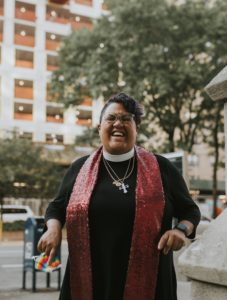 Rev. Kelsey Brown (she/her) describes herself as sometimes funny, very queer, frequently anxious, and completely absurd. A 20-something hailing from Long Island, New York – she comes equipped with the accent & attitude to back it up. In her free time, she is falling back in love with spoken word poetry, breaking it down on the dance floor, and ritual creation. She believes with her full heart that God’s delight in diversity is call for us all to embrace the fullness of humanity. Racial justice and advocacy work fuel her fire, while deep friendships and long naps quench her thirst. She can be seen in her natural habitat – quoting showtunes, doubled over in laughter and challenging others to “do the work.” Her ministry in the Evangelical Lutheran Church in America has taken many courses including camping ministry in New Jersey, Synod work in Metro New York and Internship in sunny Southern California. She is blessed to serve as the Pastor of Jehu’s Table, a Lutheran Church in Brooklyn – Pastor Kelsey brings to the Church a pulse of integrity and personhood for all people, a love of preaching and deep care for the other.
Rev. Kelsey Brown (she/her) describes herself as sometimes funny, very queer, frequently anxious, and completely absurd. A 20-something hailing from Long Island, New York – she comes equipped with the accent & attitude to back it up. In her free time, she is falling back in love with spoken word poetry, breaking it down on the dance floor, and ritual creation. She believes with her full heart that God’s delight in diversity is call for us all to embrace the fullness of humanity. Racial justice and advocacy work fuel her fire, while deep friendships and long naps quench her thirst. She can be seen in her natural habitat – quoting showtunes, doubled over in laughter and challenging others to “do the work.” Her ministry in the Evangelical Lutheran Church in America has taken many courses including camping ministry in New Jersey, Synod work in Metro New York and Internship in sunny Southern California. She is blessed to serve as the Pastor of Jehu’s Table, a Lutheran Church in Brooklyn – Pastor Kelsey brings to the Church a pulse of integrity and personhood for all people, a love of preaching and deep care for the other.
Click Here to view full event flyer

I always love when pop music uses Christian imagery. One song that has stood out in recent years is Kesha’s “Raising Hell.” In the song, Kesha does an amazing job of blending the sacred and secular, using Christian slang to describe secular things, and vice versa.
“Hands up, witness”
When I’ve heard a favorite song in worship, I’ve raised my hands in praise. When I’ve heard a great song when I’m out dancing at a bar, I’ve raised my hands in appreciation. I’ve witnessed the Holy Spirit in both places.
“Solo cup full of holy spirits”
At the church I serve, we use wine and grape juice in a cup during communion to signify the blood of Jesus during our worship services on Sunday mornings. Before seminary, either at a party or at a bar, while holding a cup of alcohol, I would have many conversations about God. These conversations helped affirm my calling to be a pastor. Both were and are holy moments.
“No walk of shame ’cause I love this dress”
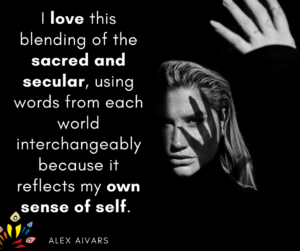
I love this blending of the sacred and secular, using words from each world interchangeably because it reflects my own sense of self. This speaks to me as a gay Christian. I’ve been told I should be ashamed of my sexuality. I’ve been told my love does not belong in the sacred world. I’ve been told I can’t be a Christian and gay. I’ve been told I can’t be a pastor and gay. But, I have found my sexuality to be holy and good. The Holy Spirit has shown itself in my life, time and time again. I can be both Christian and gay. There is the divine in my love. Yes, I’m #blessed.
“But I don’t wanna go to Heaven without raisin’ hell”
Jesus raised hell while on earth, flipping tables and sparring with the religious authorities. Jesus was, in fact, the perfect mixing of the sacred and secular, the holy and profane. In Jesus, a profane human contained sacred God. In fact, the two were so well mixed, that you couldn’t parse out which part was secular and which part was sacred. Jesus was both holy and profane, secular and sacred.
“This is our salvation”
After raising hell on earth, Jesus was then raised from hell, from the dead, to new life in heaven. God in Jesus saved us from death, so that we could share in holy, sacred, eternal life. Thanks be to God.
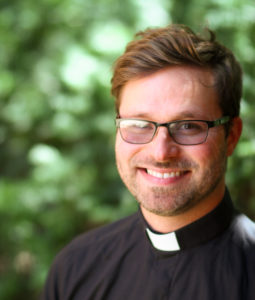 Alex Aivars (he/him) is currently in his first call as pastor of St. Stephen Lutheran Church in Lansing, MI. Since this is a part-time call, he also develops websites for businesses, non-profits, and other churches. In his spare time he likes to read, hike, bike, ski, and make art out of post-in notes.
Alex Aivars (he/him) is currently in his first call as pastor of St. Stephen Lutheran Church in Lansing, MI. Since this is a part-time call, he also develops websites for businesses, non-profits, and other churches. In his spare time he likes to read, hike, bike, ski, and make art out of post-in notes.
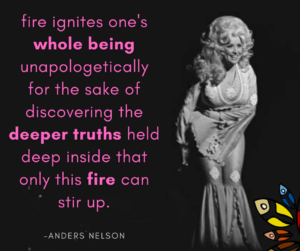
Fire doesn’t mix well with most things, nor does fire do well at listening to those who attempt to control it. It consumes, it harms, it destroys.
Yet Dolly Parton knows what it means to feel fire inside you and relish every moment of it.
For her, fire is not so much a force of destruction but the spark of beauty, the ignition of love, a burning sign of vibrant truth and deep joy. This fire ignites one’s whole being unapologetically for the sake of discovering the deeper truths held deep inside that only this fire can stir up. In a very similar way, the Holy Spirit (in all of her mysterious ways) inspires and ignites us individually and as the whole church to do the work of seeking beauty, love, truth, and joy in ourselves, each other, and our Creator. But despite the hard work of the Spirit, we might find ourselves attempting to put out these fires.
Growing up, wrestling with my queer identity felt like trying to hide a bonfire in the middle of a room full of my family and friends: nobody was willing to call it out and eventually I reached a point where I couldn’t sit there looking at it without saying something. “Hey! Have you all seen this? This is real and this is good. Okay? Okay.”
There’s liberation in seeing those flames as wholly good and not out to burn our lives to the ground. In fact, they might just inspire us towards burning down the things in our lives and our world that need to be burned down. Such discernment and reflection is necessary for the sake of the life of the church alongside the work of queer liberation. And if nothing else, this fire might inspire us to put on some drag, dance in our seminary’s chapel, and truly show the world what it’s all about.
This red hot emotion
Puts fireworks in motion
It looks like the 4th of July
There's no use in fighting
This fire you've ignited
Just stand back and watch the sparks fly
As the season of Pentecost approaches, may the revelatory sparks fly for you as they have for me. May the movement of Deep Wisdom stir up in you some meaningful, revelatory moments. And above all, may the flaming Spirit be with us until we’re all shouting, “Baby, I’m Burnin’!”
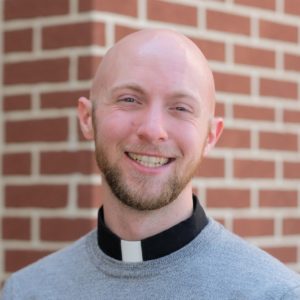 Anders Nelson (he/him) is the associate pastor at St. Paul Lutheran Church in Wheaton, Illinois where he’s been serving since the very beginning of the pandemic. He’s subsisted the last year mainly on learning how tasty vegetarian cooking can be, singing hymns and broadway numbers in the shower, and scheduling as many Dungeons and Dragons sessions as possible.
Anders Nelson (he/him) is the associate pastor at St. Paul Lutheran Church in Wheaton, Illinois where he’s been serving since the very beginning of the pandemic. He’s subsisted the last year mainly on learning how tasty vegetarian cooking can be, singing hymns and broadway numbers in the shower, and scheduling as many Dungeons and Dragons sessions as possible.
CW: song contains strong language
At 15, I was having a real doozy of a time learning to express my unique and authentic self: I was a bicurious young Lutheran navigating the cliques of straight-laced, almost exclusively white youth in the aggressively heteronormative Mennonite high school I attended. You couldn’t wear tank tops or short skirts, and you were not permitted to dance. Questioning the teachings of the Church or of Scripture was out, as was cursing or considering sex before marriage.
It was suffocating.
In these walls, which brought me spiritual darkness, a few works of art and passages of the Bible hammered through the barriers to let some light in. One of these artworks was a pop song that came through these walls like a battering ram: Meredith Brooks’ Bitch.
I’m a bitch, I’m a lover
I’m a child, I’m a mother
I’m a sinner, I’m a saint
I do not feel ashamed
I’m your hell, I’m your dream
I’m nothing in between
You know you wouldn’t want it any other way
On the surface, it was wonderful to loudly sing a curse word–I didn’t get to hear many provocative expletives at that time–but then I also realized how liberating it was to own the idea that I could sometimes be rebellious, even mutinous, toward the status quo and still be a sinner-saint child of God. (By the way, I’m convinced that if Martin Luther had been around in 1997, he’d have loved this song). I could question God like the psalmists did, and I could stand apart from some Mennonite customs and not be an awful person or an anti-Christian.
I’m 39 now, and I recently remembered Bitch and have been regularly rocking out to it. It reminds me that God didn’t make a mistake when I was created: I am an adventurous, boat-rocking queer minister who loves to not only pray and worship but also to examine, question, and disobey when called to do so. And I hope God wouldn’t have it any other way.
 Bio: Melissa May (she/her) is a pastor who served for five years in the wilds of northern Canada and western Alaska, and is now taking some time away to rest and work part-time as she interviews for possible new congregational calls. She lives with family and her very well-traveled cat, Mia, in the Shenandoah Valley of Virginia, where she’s looking forward to in-person Trivia Nights and Dungeons and Dragons sessions eventually resuming.
Bio: Melissa May (she/her) is a pastor who served for five years in the wilds of northern Canada and western Alaska, and is now taking some time away to rest and work part-time as she interviews for possible new congregational calls. She lives with family and her very well-traveled cat, Mia, in the Shenandoah Valley of Virginia, where she’s looking forward to in-person Trivia Nights and Dungeons and Dragons sessions eventually resuming.